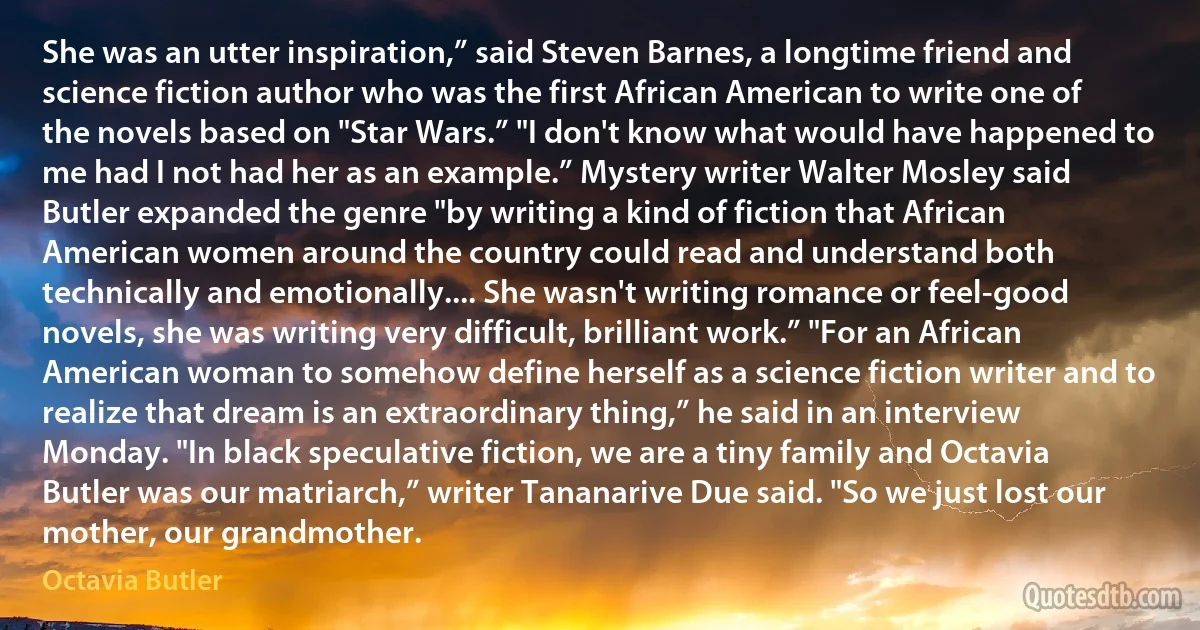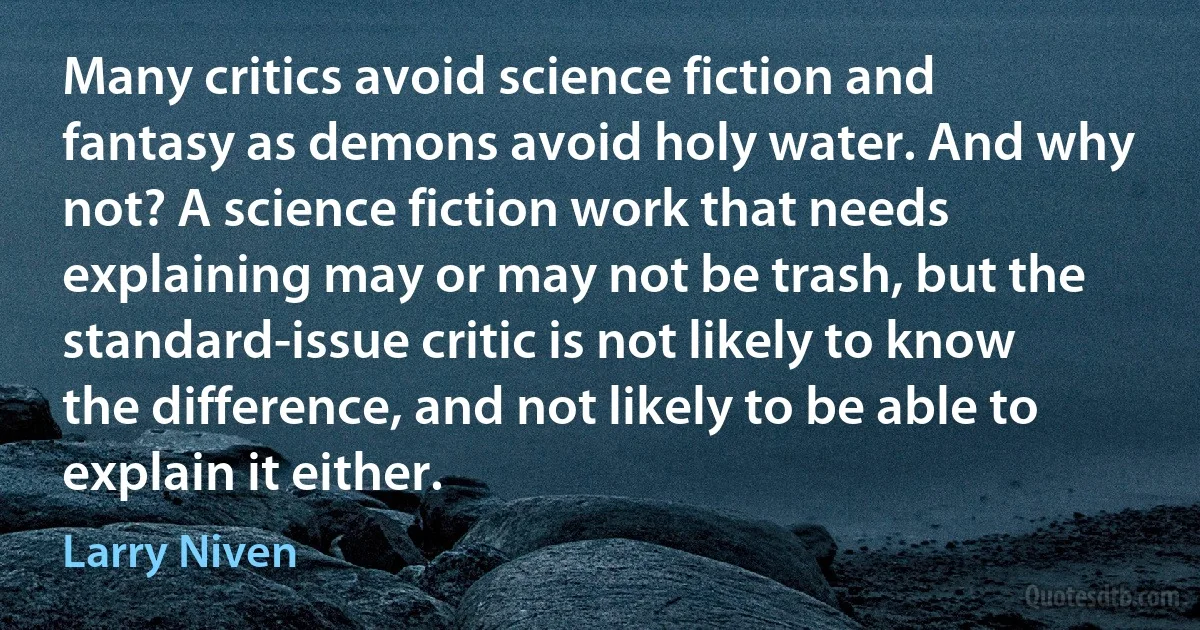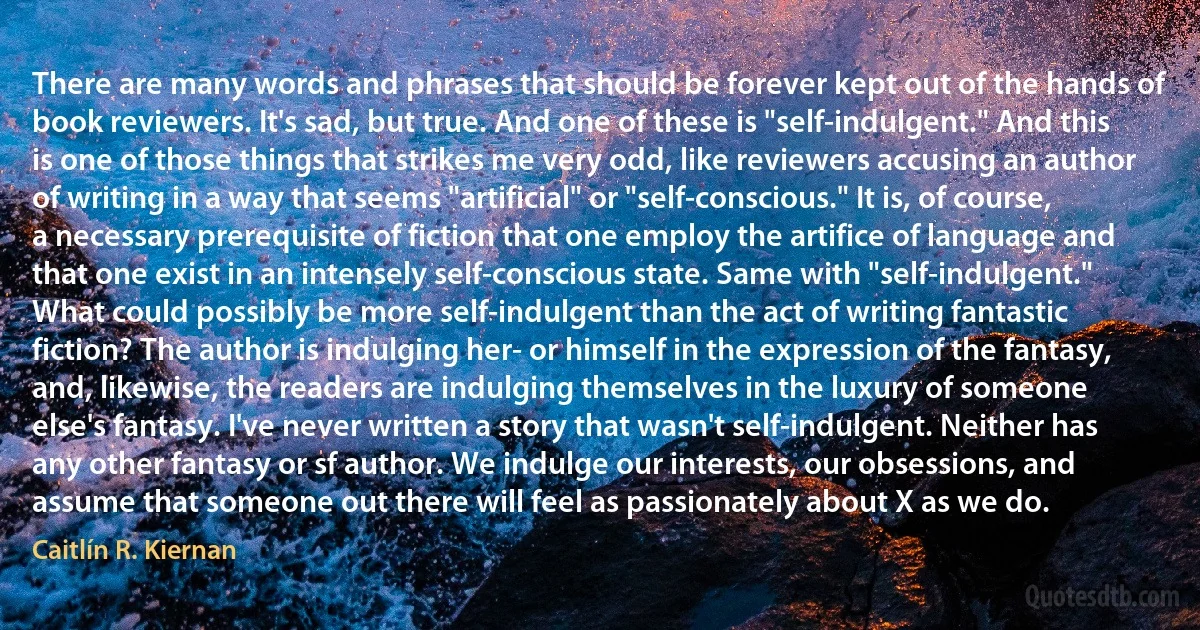Fiction Quotes - page 77
As the subtitles of Jackson's biographies echo each other-demons, haunted-so both biographies present a near-identical portrait of her as daughter, wife, mother, writer: these roles inextricably knotted together through Jackson's adult life, often to the point of near-unbearable pressure and stress. Jackson's patrician, socially conscious, and woundingly censorious mother, Geraldine Bugbee, was the great-great-granddaughter of a wealthy San Francisco architect; clearly the model for the nightmare mother-figures in Jackson's fiction, particularly the embittered invalid-mother of Hill House, Geraldine persisted in criticizing and belittling Jackson long after she had acquired national renown as a writer.

Shirley Jackson
The tension between socially acceptable housewifery and creative ambition is certainly easy to find in Jackson's life, but it's rather harder to locate in her fiction. There's no question that, in her books, the house is a deeply ambiguous symbol-a place of warmth and security and also one of imprisonment and catastrophe. But the evil that lurks in Jackson's fair-seeming homes is not housework; it's other people-husbands, neighbors, mothers, hellbent on squashing and consuming those they profess to care for. And what keeps women inside these ghastly places is not societal pressure, or a patriarchal jailer, but the demon in their own minds. In this sense, Jackson's work is less an anticipation of second-wave feminism than a conversation with her female forebears in the gothic tradition. Her stories take the figure of the imprisoned "madwoman," as found in Charlotte Perkins Gilman's "The Yellow Wallpaper" or Charlotte Brontë's Jane Eyre, and make her the warder of her own jail.

Shirley Jackson
I repeat Sturgeon's Revelation, which was wrung out of me after twenty years of wearying defense of science fiction against attacks of people who used the worst examples of the field for ammunition, and whose conclusion was that ninety percent of it is crud.
The Revelation: Ninety percent of everything is crud.
Corollary 1: The existence of immense quantities of trash in science fiction is admitted and it is regrettable; but it is no more unnatural than the existence of trash anywhere.
Corollary 2: The best science fiction is as good as the best fiction in any field.

Theodore Sturgeon
...My fiction is also influenced by women intellectuals such as Melani Budianta and Julia Suryakusuma. I love the works of male writers such as Asrul Sani, Budi Darma's Orang-orang Bloomington (The People of Bloomington), and Moetinggo Boesje's play Malam Jahanam (The Night of the Accursed), but my priority now is to learn more about writings by women. Just like in many Western countries, the practice of defining literature has often excluded or ignored women's writings and their contexts.

Intan Paramaditha
I explained that most great works of the imagination were meant to make you feel like a stranger in your own home. The best fiction always forced us to question what we took for granted. It questioned traditions and expectations when they seemed too immutable. I told my students I wanted them in their readings to consider in what ways these works unsettled them, made them a little uneasy, made them look around and consider the world, like Alice in Wonderland, through different eyes.

Azar Nafisi
Wells's book rests entirely on a flawed syllogism: hence, textbooks illustrate evolution with examples; these examples are sometimes presented in incorrect or misleading ways; therefore evolution is a fiction. The second premise is not generally true, and even if it were, the conclusion would not follow. To compound the absurdity, Wells concludes that a cabal of evil scientists, "the Darwinian establishment", uses fraud and distortion to buttress the crumbling edifice of evolution. Wells' final chapter urges his readers to lobby the US government to eliminate research funding for evolutionary biology.

Jonathan Wells
When was reviewing Doris Lessing's last two books from the Shikasta series, I found that she has discovered what I, to my great joy, had discovered a little earlier: that (a) if you're writing what they call science fiction, you're absolutely free-you can write anything you damn please, and (b) that if you take seriously the science fiction premise, you are furnished with an inexhaustable supply of absolutely beautiful and complex metaphors for our present situation, for who and where we are now, and I think it's not only women who have found this out. Angus Wilson was one of the first to do this with The Old Man in the Zoo years ago. That is a science fiction novel, if you look at it closely.

Angus Wilson
When names are brought up as pioneers of "modern” science fiction, remembers Simak. this veteran's stories go way back into the Gernsback days, and they've been good all along. Whether he has run neck-and-neck with the big-name leaders, or paced them most of the way, it's hard to say.

Clifford D. Simak
16) There is no cause so right that one cannot find a fool following it.
To prove a point, one may seek out a foolish Socialist, thirteenth century Liberal, Scientologist, High Frontier advocate, Mensa member, science fiction fan, Jim Bakker acolyte, Christian, witch, or fanatical devotee of Special Interest Lib. It doesn't really reflect on the cause itself. Ad hominem argument saves time, but it's still a fallacy.

Larry Niven
I've always considered myself an offbeat writer. Out here in California they like to categorize, so I'm a science fiction writer. I wrote science fiction to break into the writing business. My love is fantasy. I wrote one of my early novels in four days sitting in a closet which I'd converted into an office, using an old Smith-Corona that my parents had given me for Christmas when I was 12.

Richard Matheson
He came to science fiction in 1952; some two or three years later, somebody told him he was writing parables, and Sheckley believed it. The stripped quality of his subsequent work, and its utter divorcement from fact and logic, are traceable to this unfortunate influence.
He has a unique touch with a wacky civilization, a clean, compact style, and a satirical wit that is dry without being bitter.

Robert Sheckley
But all I have is hearsay, passed on by others of my kind.”
"Including this ‘nameless' stuff,” I said.
"That's true. And at various times in my life, I've wondered whether it might not be a delusion-some sort of fiction that we share. Like a religion: there's no way you or I could prove that the nameless don't exist.

Joe Haldeman
Science fiction may be defined as that branch of literature which deals with the response of human beings to advances in science and technology. Actual change in science and technology, occurring quickly enough and striking deeply enough to affect a human being in the course of his normal lifetime, is a phenomenon peculiar to the world only since the Industrial Revolution ... The first well-known writer who responded to this new factor in human affairs by dealing regularly with science fiction, by studying the effect of additional scientific advance upon mankind ... was Jules Verne. In the English language, the early master was H. G. Wells. Between them, they laid the foundation for every theme upon which science fiction writers have been ringing variations ever since.

Isaac Asimov
The way to teach in this world is to pretend you're not teaching. Science fiction offers the chance to pretend to look the other way while teaching. Science fiction is also a great way to pretend you are writing about the future when in reality you are attacking the recent past and the present. You can criticize communists, racists, fascists or any other clear and present danger, and they can't imagine you are writing about them.

Ray Bradbury
I don't care what the science fiction trade technicians say, either. They are furious that I get away with murder. I use a scientific idea as a platform to leap into the air and never come back. This keeps them angry at me. They still begrudge my putting an atmosphere on Mars in The Martian Chronicles more than 40 years ago.

Ray Bradbury
When I was seventeen I read everything by Robert Heinlein and Arthur Clarke, and the early writings of Theodore Sturgeon and Van Vogt - all the people who appeared in Astounding Science Fiction - but my big science-fiction influences are H. G. Wells and Jules Verne. I've found that I'm a lot like Verne - a writer of moral fables, an instructor in the humanities. He believes the human being is in a strange situation in a very strange world, and he believes that we can triumph by behaving morally. His hero Nemo - who in a way is the flip side of Melville's madman, Ahab - goes about the world taking weapons away from people to instruct them toward peace.

Ray Bradbury
Take some time and put the Bible on your summer reading list. Try and stick with it cover to cover. Not because it teaches history; we've shown you it doesn't. Read it because you'll see for yourself what the Bible is all about. It sure isn't great literature. If it were published as fiction, no reviewer would give it a passing grade. There are some vivid scenes and some quotable phrases, but there's no plot, no structure, there's a tremendous amount of filler, and the characters are painfully one-dimensional. Whatever you do, don't read the Bible for a moral code: it advocates prejudice, cruelty, superstition, and murder. Read it because: we need more atheists - and nothin' will get you there faster than readin' the damn Bible.

Penn Jillette
The only people who have the long view are some scientists and some science fiction writers. I have always lived in a world in which I'm just a spot in history. My life is not the important point. I'm just part of the continuum, and that continuum, to me, is a marvelous thing. The history of life, and the history of the planet, should go on and on and on and on. I cannot conceive of anything in the universe that has more meaning than that.

Sheri S. Tepper
Once the curtain is raised, the actor ceases to belong to himself. He belongs to his character, to his author, to his public. He must do the impossible to identify himself with the first, not to betray the second, and not to disappoint the third. And to this end the actor must forget his personality and throw aside his joys and sorrows. He must present the public with the reality of a being who for him is only a fiction. With his own eyes, he must shed the tears of the other. With his own voice, he must groan the anguish of the other. His own heart beats as if it would burst, for it is the other's heart that beats in his heart. And when he retires from a tragic or dramatic scene, if he has properly rendered his character, he must be panting and exhausted.

Sarah Bernhardt
Cuba is at the heart of my fiction, even when it's just an echo, like in "Kimberle.” I don't think a day goes by that I don't remember in some conscious way that I'm Cuban. But my relationship with Cuba changes as time goes by, not just because of changes in Cuba but because of changes in my own life. When my son was born almost six years ago, it totally altered everything. For example, instead of going to Cuba, I spent a great deal more time in Miami, because that's where my mom lived, and I really wanted my son and my mom to have a relationship...

Achy Obejas
One of the biggest roles of science fiction is to prepare people to accept the future without pain and to encourage a flexibility of mind. Politicians should read science fiction, not westerns and detective stories. Two-thirds of 2001 is realistic - hardware and technology - to establish background for the metaphysical, philosophical, and religious meanings later.

Arthur C. Clarke



